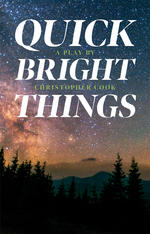
Acknowledging the journey
An interview with Christopher Cook on Quick Bright Things
Mental health is different for everyone, from the way we interpret our own to how we handle others’. In Christopher Cook’s Quick Bright Things, each family member interprets one of their own’s recent diagnosis in their own way, which sometimes ties into their own battles. Gerome has just learned he has schizophrenia, and he wants to know where it came from. His adoptive father Nick brings him to meet his birth mother, while stopping at Nick’s brother’s house. Through the weekend, everyone shares their opinion, leading them to a dangerous breaking point.
We spoke to Christopher, who besides being a playwright is also a therapist and clinician-researcher, on writing about mental wellness, how the story developed, and some good advice.
You wrote the first scene of Quick Bright Things over a decade ago — and I imagine a lot has changed since then, such as the stigma around medication — what had inspired you then, and why did you want to keep it going?
Ten years ago I was well into a personal mental health journey and just beginning to explore what it might be like to pursue training as a mental health professional. The script scared me. I had doubts about my abilities as a writer and was worried about writing a script that would become an “issue” play. But the father and son in the play, Nick and Gerome, kept me coming back to the story. I wanted to explore a father and son’s journey toward each other amid mental wellness challenges. Really, most of my storytelling returns to mental wellness journeys and family in one way or another.
And in the past ten years, yes, our understanding of different mental health issues has progressed in many different ways. Even the way we talk about specific diagnoses has changed. There is a whole new edition of the Diagnostic and Statistical Manual of Mental Disorders (DSM), published in 2013, which altered some of the language that mental health professionals use for diagnosis in North America. For example, in terms of Gerome’s schizophrenia diagnosis, ten years ago, different categories might have been assigned to someone with that diagnosis: “paranoid" type or “disorganized" type. But the newest edition of the DSM did away with these types as they were not particularly useful in terms of categorization or treatment, which shows that even within ten years, we can re-invent the language we use to talk about different mental health challenges. It’s also an important reminder that our mental health knowledge is fluid and always growing.
Of course, in the last decade, there’s much that has stayed the same, too. You mention stigma and medication — I think in many ways, in many communities, we are talking about mental health, as well as medication as one possible mental health support, more than we were even then. Talking openly about mental health can certainly help reduce stigma, but I still think mental health can be an uncomfortable topic for many of us. And the tricky thing about stigma is it goes underground. Why do we use a word like “crazy,” as in, “That’s so crazy!” or “You’re crazy!” when something makes us uncomfortable or upset? It’s the same with words like “insane” or “mental.” In the next ten years, we need to continue to examine overt and covert mental health stigma within our communities.
These characters feel so raw and real — how has your background in psychology helped your writing?
Counselling Psychology is a discipline with its own unique language and approaches, but I often get a kick out of thinking about the similarities between my theatre and psychology training. What I find so useful about Counselling Psychology from a writer’s perspective is that it offers so many different lenses from which to view human experience. Depth psychology (think Jungian, Adlerian, or psychoanalytic), systems-focused approaches (like family therapy), feminist therapy, narrative therapy — the list goes on and on, and all of these approaches have something different to say about character and voice and invite seeing the world through different eyes.
Writing a character and falling in love are the same thing to me — it’s a very raw and real process that involves such joy and heartbreak. Counselling Psychology has helped me figure out how I can relate as authentically as possible to these characters that I fall in love with.
Did any specific character come to you first? How did you decide to form the family around them?
Originally the play was meant to be a road-trip script. Nick and Gerome were stopping in to visit family in Thunder Bay while driving across Canada to meet Gerome’s biological mother somewhere on the West Coast. The first scene of the play, the conversation around the dinner table, started playing out in my head. Then after I wrote the family — Reid, Marion, Michael — I ran into a problem. I didn’t want to say goodbye to them! That family took over the play, much like they take over Nick and Gerome’s weekend.
Rather than the play be entirely about Gerome’s schizophrenia, you also take great care to show what each character is dealing with, and how that affects their interactions. What can this teach us about how to understand others’ mental health?
We can never just say, “This person has that mental health diagnosis, and it manifests with these symptoms,” without taking the context or system in which that person finds themselves into account. A broken leg is a broken leg, but one person’s schizophrenia diagnosis may look very different from someone else’s because their context is entirely different.
I also wanted to acknowledge that within any group, like the family in the play, there may be named mental health issues, and those that remain unnamed; those that we treat, and those that we write off as socially acceptable. Most of us, at some point in our lives, will go on some kind of journey to do with our mental health, and these journeys all look different. But acknowledging these journeys can bring us closer.
What advice can you give to writers for writing about mental illness/wellness?
As I mentioned, I was worried about writing an “issue” play when I first started this script. Now I don’t think “issue” plays really exist when we write about mental health. Issues are general, and we can’t write generally about mental health, we can only write about individual experiences. These experiences may have certain similarities to others, but they usually look so unique. If I could go back in time, I would tell my past self, “Let go of your worry about writing a script weighed down by an ‘issue.’ Get on with writing the play these characters deserve, the one that speaks to their distinct journeys.”
What’s next for you?
I’m reworking and adapting a short one-person show I wrote several years ago, Gerty! Live! In Concert!, about female impersonators entertaining troops in World War Two. I’m playing with history and fiction — Canadian female impersonators did entertain soldiers in WW2, and the script is set in an alternate history where gay marriage was legalized in several countries in the early 1900s. I am also completing my first year of the Ph.D. program in Counselling Psychology at UBC. So, keeping busy!
And lastly, knowing we are in challenging times right now that will greatly affect a lot of people’s mental wellness, can you share any words of encouragement?
First off, dear reader, I think you deserve a medal for transitioning to a new daily living experience that many of us couldn’t have imagined four weeks ago.
Know that our experience is rarely ever exclusively one thing — we can be hurting, and there may be one part of us — even the smallest part of us, our baby toe! — that feels lighter. Or we may be feeling grateful, and there’s a tiny part of – that baby toe again, or that space in our chest — that feels anxious. We can hold all of these things in our experience at once if we acknowledge them and allow them to be there. And if we acknowledge we’re not just feeling one thing, we can also acknowledge, even if we are home-bound, that our inner experience is changing, little by little, every moment of every day.
And today — and for the next while — maybe just acknowledging that can be enough.
To find out how the journey goes for Gerome and his family, read Quick Bright Things now!



Comments